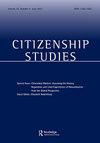Remember to die: recovering belonging in diasporic end of life art
IF 1.9
3区 社会学
Q3 POLITICAL SCIENCE
引用次数: 1
Abstract
ABSTRACT Anticolonial and Black feminist scholars and artists have made a convincing case that political and social legibility for racially marked peoples requires active and multi-sensory reiteration. To presence what has been effaced or distorted, images, numbers, and texts must be redacted, annotated, rescaled, reframed, relocated, and repurposed. In dialogue with this work, this piece discusses the vernacular of the diasporic art made in English hospices with Black and Brown migrants at the end of their lives. I suggest that such outsider art makes and rehearses migrant belonging in two interrelated ways: by creating temporary niches for rest, recovery, and pleasure; and by bringing into appearance the quotidian, heterogenous times of Black and Brown diasporic belonging that are out of sync with the rights and timelines of formal citizenship. The critical possibilities that attunement to rest and pleasure can precipitate in citizenship studies is an underlying theme.记住死亡:在散居的生命终结艺术中找回归属感
反殖民主义和黑人女权主义学者和艺术家已经提出了一个令人信服的案例,即种族标记的人民的政治和社会易读性需要积极和多感官的重申。为了呈现被抹去或扭曲的东西,图像、数字和文本必须被编辑、注释、重新缩放、重新定位、重新定位和重新定位。在与这件作品的对话中,这件作品讨论了在英国临终关怀院里与黑人和棕色人种的移民一起创作的流散艺术的方言。我认为这种外来者艺术以两种相互关联的方式制造和排练移民的归属感:通过创造暂时的休息、恢复和娱乐的壁龛;并将黑人和棕色人种的流散归属与正式公民身份的权利和时间线不同步的日常、异质时代呈现出来。在公民身份研究中,对休息和快乐的调适可以沉淀出重要的可能性,这是一个潜在的主题。
本文章由计算机程序翻译,如有差异,请以英文原文为准。
求助全文
约1分钟内获得全文
求助全文
来源期刊

Citizenship Studies
POLITICAL SCIENCE-
CiteScore
3.60
自引率
11.10%
发文量
85
期刊介绍:
Citizenship Studies publishes internationally recognised scholarly work on contemporary issues in citizenship, human rights and democratic processes from an interdisciplinary perspective covering the fields of politics, sociology, history and cultural studies. It seeks to lead an international debate on the academic analysis of citizenship, and also aims to cross the division between internal and academic and external public debate. The journal focuses on debates that move beyond conventional notions of citizenship, and treats citizenship as a strategic concept that is central in the analysis of identity, participation, empowerment, human rights and the public interest.
 求助内容:
求助内容: 应助结果提醒方式:
应助结果提醒方式:


